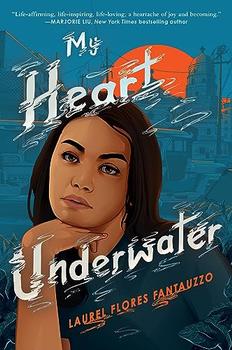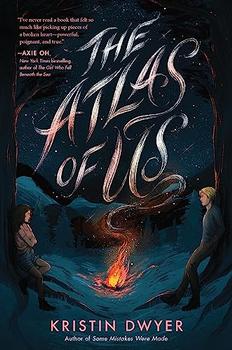Summary | Excerpt | Reviews | Beyond the book | Read-Alikes | Genres & Themes | Author Bio

Critics' Opinion:
Readers' Opinion:
First Published:
Oct 2020, 320 pages
Paperback:
Nov 2023, 320 pages
 Book Reviewed by:
Book Reviewed by:
Catherine M Andronik
Buy This Book
Corazon — Cory — Tagubio is a Filipina-American teenager living with her family in California. She knows she could be a better daughter and a better student at her Catholic high school. But these ordinary concerns are set aside when a new AP World History substitute teacher, Ms. Holden, enters her life, tanned and glowing from surfing, full of stories about European history, attractive to Cory in a way she hasn't felt before. Around the same time, Cory's father has a work-related accident that puts him in a coma, and the doctors are not hopeful. The relationship between Cory and Ms. Holden deepens, and Cory's mother catches them kissing. Before Cory knows it she is on her way to Manila in the Philippines to live with Jun, the older half brother she has never met in person, the child of her father's first marriage. In Manila, she meets her mother's entitled family and the domestic workers who serve them, her much less wealthy father's fallen-from-grace brother, and most importantly, Jun and his friends. Each of these characters widens Cory's perspective on what is important in life, and what real love looks like.
As its title indicates, the novel is framed by water. Cory's relationship with Ms. Holden is centered on the older woman's surfing; their days are spent at the beach, where they fall into what somewhat overprotected Cory sees as love. Later, in Manila, staying overnight in a seaside hostel with Jun and his friends, Cory realizes that, though she has been living on an island for months, she never even thought about the sea surrounding her until now. She remembers childhood days at the beach where her father would point across the ocean and tell her home was that way. Now, she finds herself looking across the Pacific in the opposite direction, feeling at home on either side.
Living in Manila also offers Cory a new perspective on her parents and the reader a greater understanding of wealth disparities in Manila. Cory's mother lived in a rich household complete with servants growing up, but a rebellious streak kept her from being the favored child. The mother Cory has always known is loving, frugal, strong and kind (even in sending Cory to the Philippines), and graciously understanding of her husband's son. She is nothing like Cory's bossy, wealth- and status-conscious aunt, who had been the favorite growing up. Her family has always looked down on Cory's father because of his poor background and his previous marriage, despite his sense of humor, his love of song, and his ability to bring joy into a room. The scenes in which Cory and Jun keep vigil at their father's hospital bedside with Cory's mother show what family is truly about.
The novel is full of rich fragments of life in Manila, from Jollibee restaurant chain takeout to brief conversations in Tagalog. The meanings of these exchanges are usually understandable in context, but a glossary (not present in the digital version reviewed here) would have been welcome. There are also some loose threads at the end of the novel that may leave the reader feeling a bit unsatisfied. However, while the ending is abrupt, it seems to represent the notion that Cory is embarking on a new chapter in her life.
![]() This review was originally published in The BookBrowse Review in November 2020, and has been updated for the
January 2024 edition.
Click here to go to this issue.
This review was originally published in The BookBrowse Review in November 2020, and has been updated for the
January 2024 edition.
Click here to go to this issue.

If you liked My Heart Underwater, try these:

by Jas Hammonds
Published 2024
Family secrets, a swoon-worthy romance, and a slow-burn mystery collide in We Deserve Monuments, a YA debut from Jas Hammonds that explores how racial violence can ripple down through generations.

by Kristin Dwyer
Published 2024
"A complete knockout. Readers will be thinking of this story long after they finish the final page." —Adalyn Grace, New York Times bestselling author of Belladonna





The House on Biscayne Bay
by Chanel Cleeton
As death stalks a gothic mansion in Miami, the lives of two women intertwine as the past and present collide.

The Flower Sisters
by Michelle Collins Anderson
From the new Fannie Flagg of the Ozarks, a richly-woven story of family, forgiveness, and reinvention.

The Funeral Cryer by Wenyan Lu
Debut novelist Wenyan Lu brings us this witty yet profound story about one woman's midlife reawakening in contemporary rural China.
Your guide toexceptional books
BookBrowse seeks out and recommends the best in contemporary fiction and nonfiction—books that not only engage and entertain but also deepen our understanding of ourselves and the world around us.